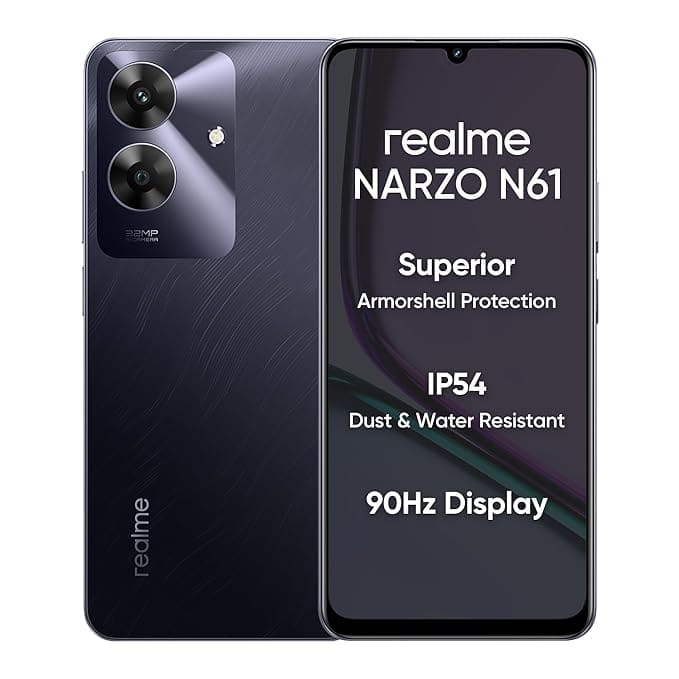English : Term 3 Unit 1 : The Best Policy
UNIT 1
The Best Policy
I give the missing thing to the owner or to the police. Do you ?
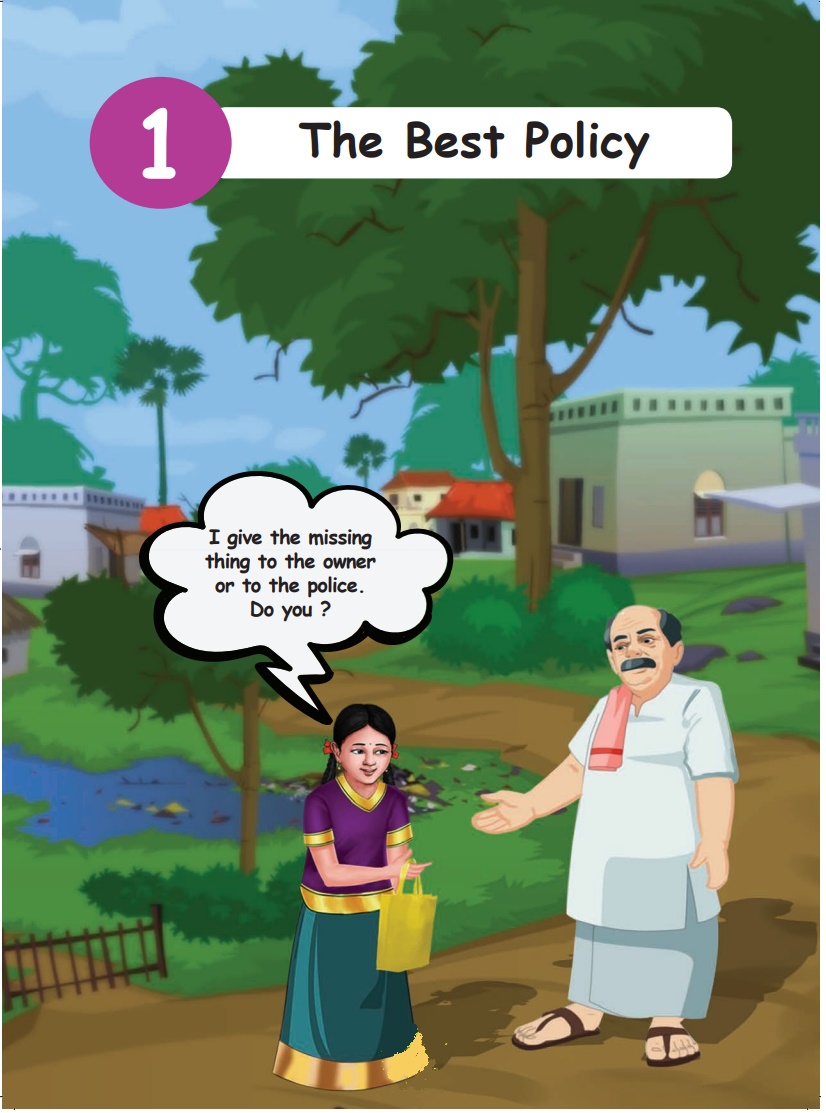
MY LITTLE PICTIONARY
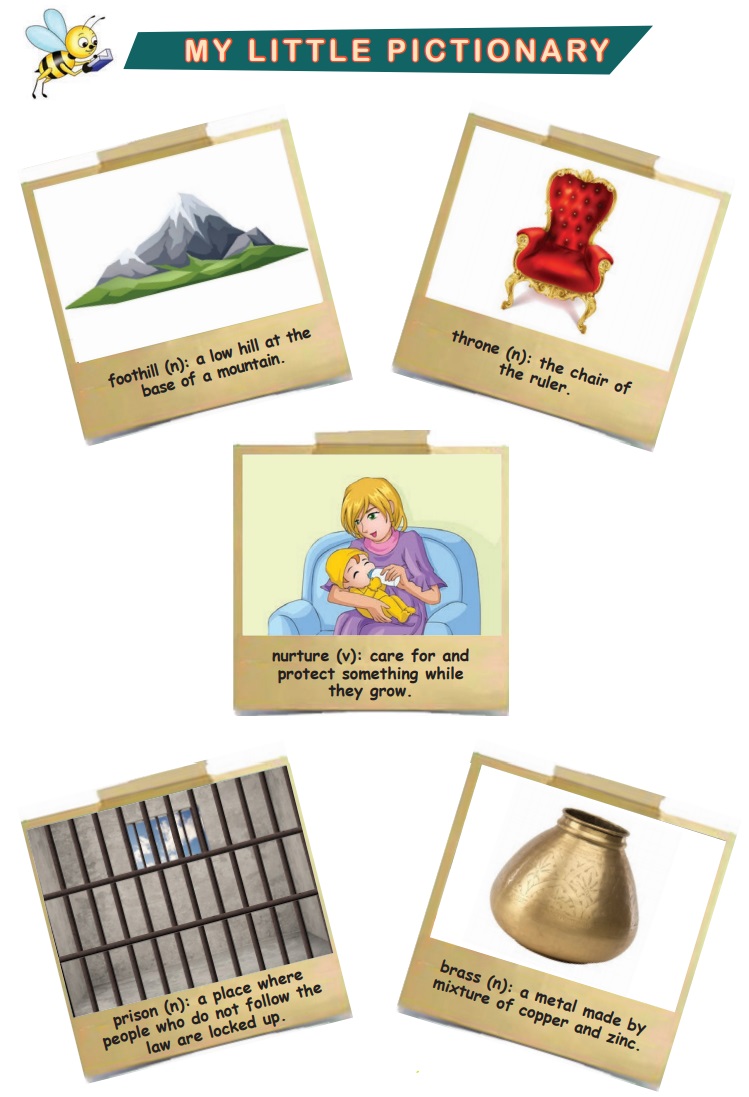
LET US LEARN
The Seven Seeds
Long ago, there was a kingdom at the foothills of Anaimalai. The kingdom flourished in trade andarts under the rule of their king’s rule. He was respected and revered by all. It has been thirty years under his rule now. One day, the ageing king woke up worried. He was getting very old and had no heir to take his place. He decided to adopt and raise a child as the heir, but he knew that the adopted child must be honest.
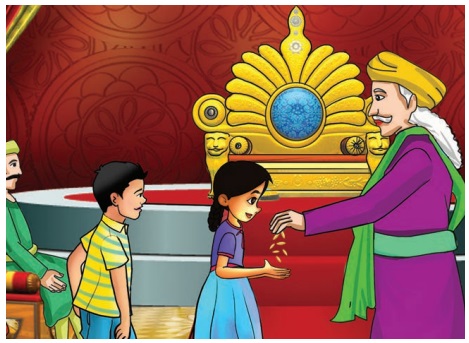
To find the child, he held a competition in his kingdom that was open to all. The competition had many levels and spanned for nearly six months. At the end of it, five boys and five girls made it to the very last round. There seemed little to separate them; each one of them was intelligent, strong and capable.
The king said, “I have one last test for you all. The one who passes this test will be the winner. As you all know the winner will be the heir to my throne.” He continued, “Our kingdom depends on agriculture, so the new leader must know how to grow plants. Here are seven seeds of wheat for each of you. Take them home. Plant and nurture them for six weeks. At the end of the sixth week, we shall see who has done the best job of nurturing them. That person will be the heir to the throne.”
Think: Can you guess how the king would find the honest kid using the seeds?

The children took their seeds and hurried home. They all got a pot, prepared some soil and sowed their seeds. The entire kingdom was excited. They were all anxious to see who thenext king would be.
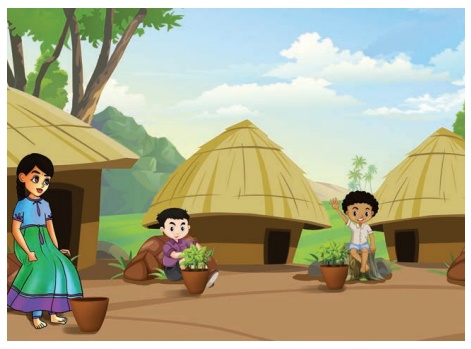
One of the finalists was Ani. The days stretched into weeks, but the seeds failed to sprout. Ani didn’t know what had gone wrong. Ani and her parents were heartbroken. She had selected the soil with care, put the right manure, and very dutifully watered it. She had even prayed over it, day and night, and yet her seeds hadn’t grown at all.
Some of her friends advised her to go and buy new seeds from the market and plant. After all, they said, “How can anyone tell if they were the same seeds?” Ani’s parents had always taught her the value of honesty. They reminded her that if the king wanted them to plant just any wheat, he would have asked them to get their seed.
“If you use anything different from what the king gave, that would be dishonest. Maybe you’re not destined for the throne. If so, let it be, but it would be wrong to cheat the king,” they told her. Ani agreed.
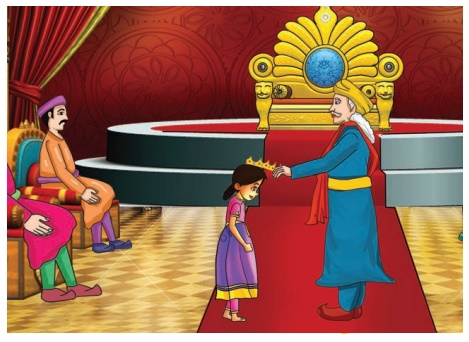
It had been six weeks now. The much-awaited day had come. The children returned to the palace, each of them proudly carrying a pot of healthy seedlings. It was obvious that the other nine had great success with their seeds.
The king arrived. He was beaming looking at the children and their pot of healthy seedlings. He began walking along the line of pots the children had kept. He asked each of them, “Is this what grew from the seeds I gave you?” And each of them responded, “Yes, your majesty.” And the king would nod and move down the line.
The king finally got to the last one, Ani. The girl was shaking. She feared that the king might have thrown her into prison for wasting his precious seeds. “What did you do with the seeds I gave you?” the king asked.
“Your majesty, I planted them and cared for them every day. I am sorry but, they failed to sprout,” Ani said. She hung her head in shame. “Boo!” jeered the crowd.
But the king raised his hands and signalled for silence. Then he said, “Dear people, behold my heir. The next leader of our kingdom!”
The people were confused, “Why that girl? How can she be the right choice?”
The king took his place on his throne with Ani by his side and said, “I gave each of them, seven seeds. This test was not for growing wheat. It was a test of character, a test of honesty. If a leader must have one quality, it must be that he or she should be honest. People should be able to trust the leader. Only this girl passed the test. I gave boiled seeds and boiled seeds cannot grow.”
Glossary
kingdom: a region ruled by a king
flourished: developed in a healthy way
revered: respected
ageing: getting old
adopt: legally take and bring up
leader: head
nurture: care, protect and grow
anxious: eager
destiny: fate
behold: see
LET US UNDERSTAND
A. Choose the correct option.
1. The kingdom was situated in the foothills of __________.
a. Kollimalai
b. Sirumalai
c. Anaimalai
Answer: c. Anaimalai
2. The king looked for a __________.
a. minister
b. leader
c. great soldier
Answer b. leader
3. The king gave__________ seeds.
a. five
b. six
c. seven
Answer: c. seven
4. In real, the test is for __________.
a. testing honesty
b. growing wheat
c. growing paddy
Answer: a. testing honesty
B. Read the statement and write True or False.
1. The king shouted at Ani. (False)
2. Ani grew the seed well. (False)
3. Ani valued honesty. (True)
C. Answer the questions.
1. How long did the competition take to reach the final?
The competition took six months to reach the finals.
2. Why did the king want a leader who knows to grow a plant?
The kingdom depended on agriculture. So the king wanted a dealer who knew how to grow plants.
3. Did the seeds given to Ani? Sprout why?
No, the seeds given to Ani did not sprout because they were boiled seeds.
4. What did Ani’s parents teach her?
Ani’s parents taught her honesty.
5. Do you think Ani will be a good leader? Why?
I Yes, I think that Ani will be a good leader because she is honest.
LET US BUILD
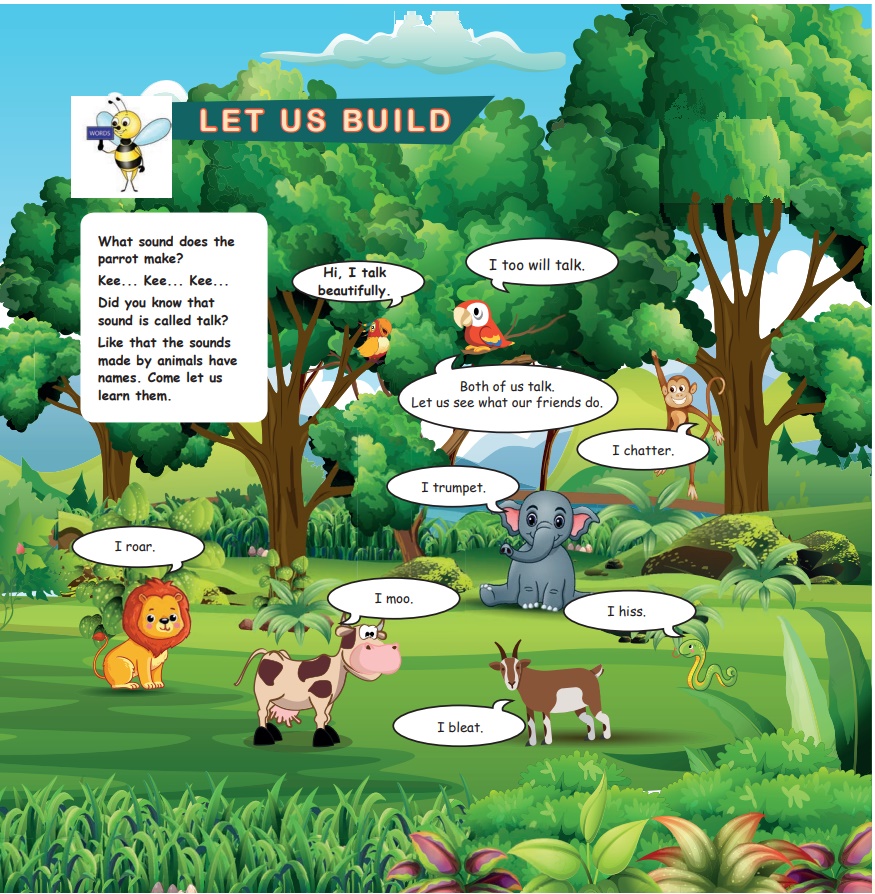
What sound does the parrot make?
Kee… Kee… Kee…
Did you know that sound is called talk?
Like that the sounds made by animals have names. Come let us learn them.
Hi, I talk beautifully.
I too will talk.
Both of us talk. Let us see what our friends do.
I chatter.
I trumpet.
I roar.
I moo.
I hiss.
I bleat.
Let us learn some more sounds.
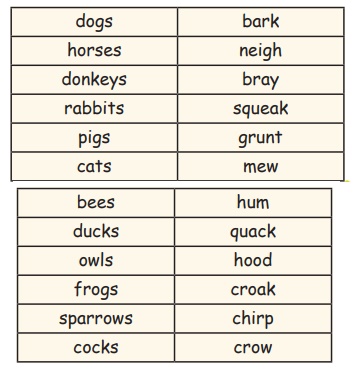
A. Match the animals with their sounds.
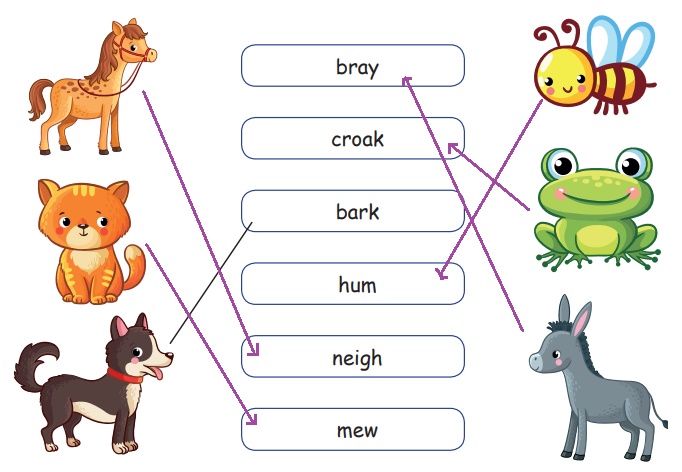
B. What we say?
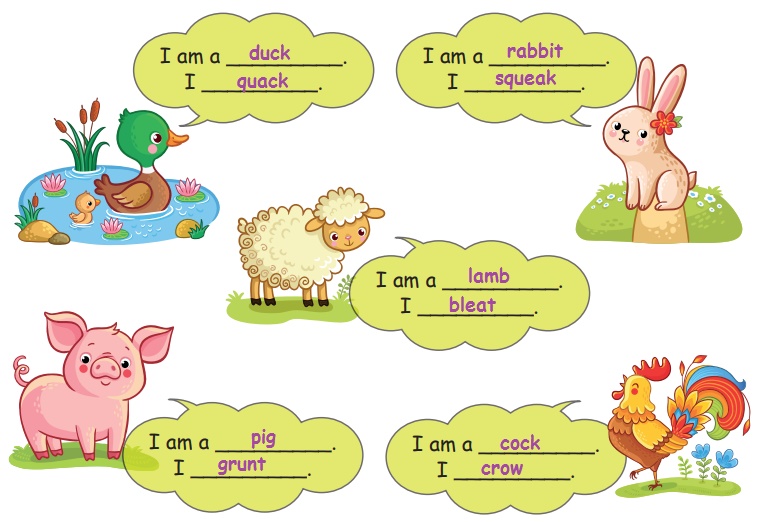
I am a duck. I quack.
I am a rabbit. I squeak.
I am a lamb. I bleat.
I am a pig. I grunt.
I am a cock. I crow.
LET US SING
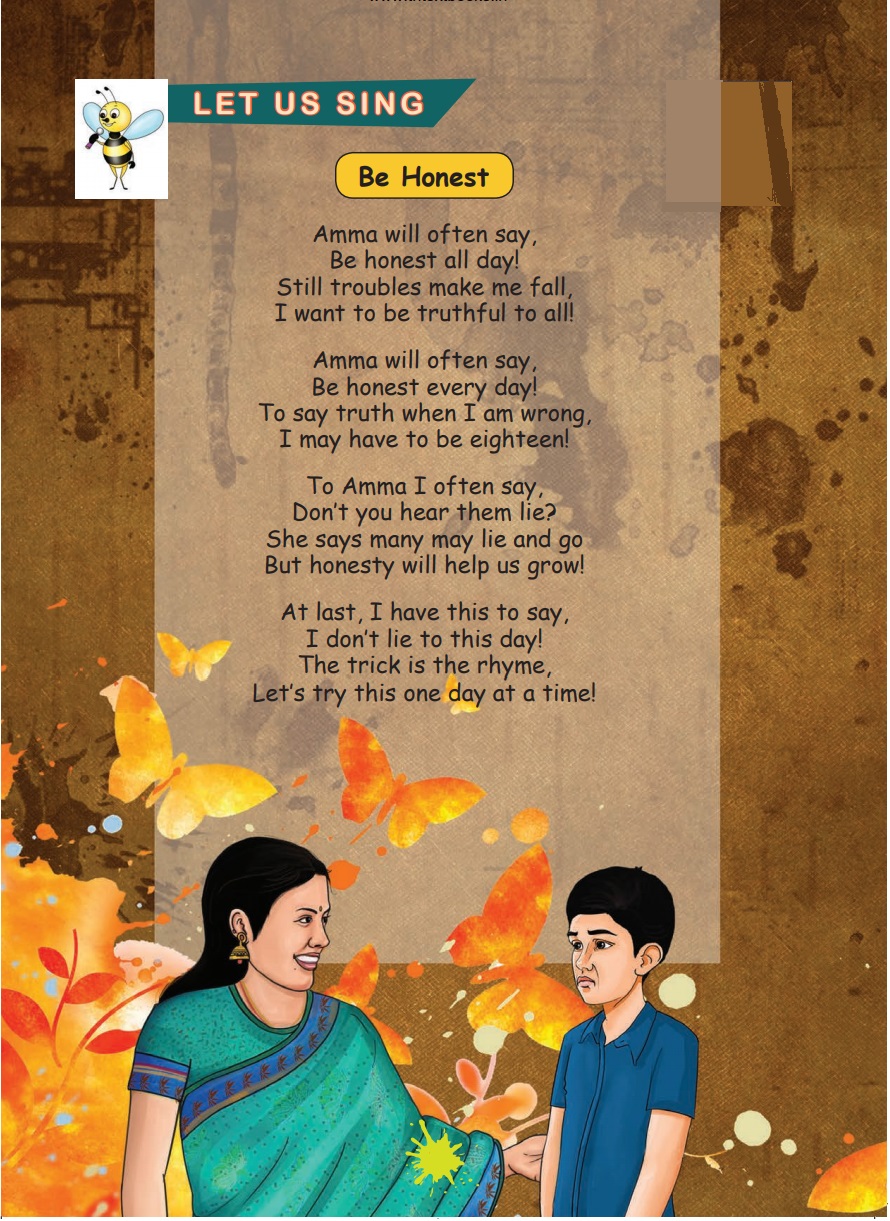
Be Honest
Amma will often say,
Be honest all day!
Still troubles make me fall,
I want to be truthful to all!
Amma will often say,
Be honest every day!
To say truth when I am wrong,
I may have to be eighteen!
To Amma I often say,
Don’t you hear them lie?
She says many may lie and go
But honesty will help us grow!
At last, I have this to say,
I don’t lie to this day!
The trick is the rhyme,
Let’s try this one day at a time!
Glossary
often: frequently
troubles: difficulty or problem
lie: a false statement
grow: improve
trick: technique
A. Match the rhyming words.
say – grow
all – time
go – day
rhyme – fall
Answer:
say – day
all – fall
go – grow
rhyme – time
B. Fill in the blanks.
1. Amma will often say to be honest.
2. We shouldn’t lie ever.
3. Many may lie and go.
C. Answer the questions.
1. What makes him fall?
Troubles make him fall.
2. What does Amma often say?
‘Be honest all day’
3. What will help us grow?
Honesty will help us grow.
4. What will help you say the truth?
The rhyme about being honest will help me say the truth.
5. Do you tell the truth always? Why?
Yes, I always tell the truth because I know that honesty is the best policy.
LET US KNOW
We have already learnt to use a, an and the.
Can you try to fill the blanks below with a, an and the?
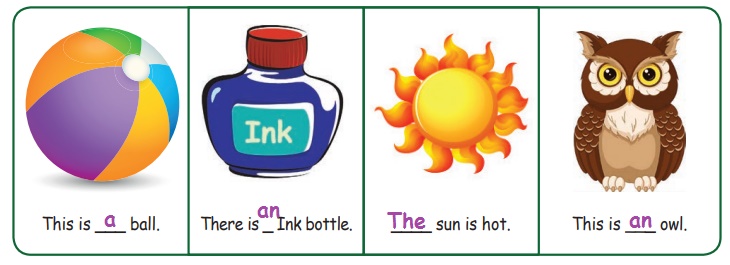
This is a ball.
There is an Ink bottle.
The sun is hot.
This is an owl.
These words are known as articles. Let us learn how to use them again!
We use an before words that begin with the sounds of a,e,i,o and u

an apple
an umbrella
an orange
an hour
We use a when the words begin with any other sound.
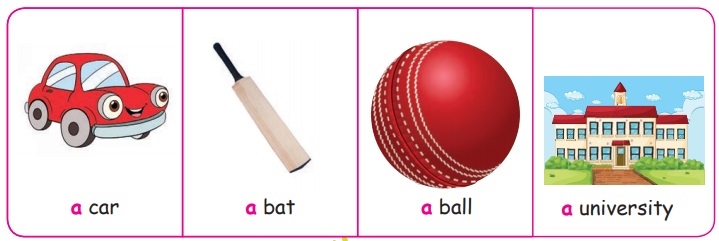
a car
a bat
a ball
a university
Why we use an for hour and a for university?
This is because hour sounds like ox and orange in the beginning so we use an. Similarly, the word university even though starts with the letter ‘u’ has the same sound as yellow or yak in the beginning so we use a.
Write a or an.
Why don’t we use an for home and not a for umbrella?
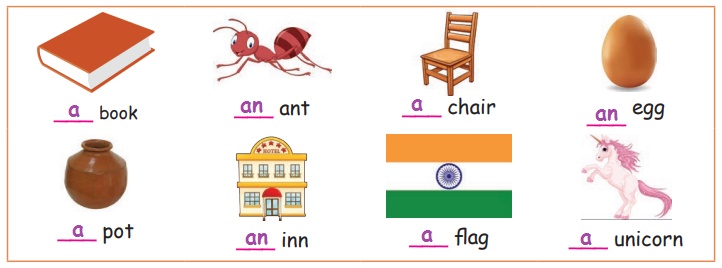
a book ; an ant ; a chair ; an egg ; a pot ; an inn ; a flag ; a unicorn
We already know that the is used when we talk of a particular thing. The article, the is also used before the names of unique things like mountains, rivers, lakes, seas, oceans, famous books and directions.
Fill in the blanks using a, an and the.
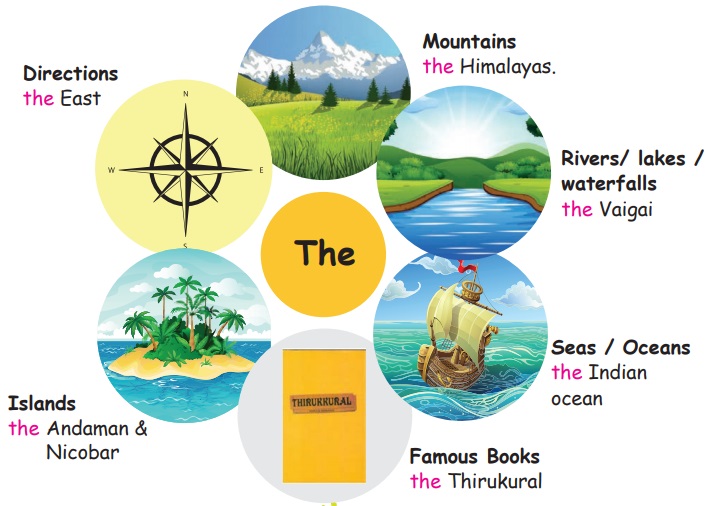
1. The Earth goes around the Sun.
2. I bought a pair of shoes.
3. I am a university student.
4. Kiran sails in the Indian ocean.
5. The camel is the ship of the desert.
6. The Jungle book has won many awards.
7. Harichandra was an honest king.
8. I met a boy in the street.
9. She returned after an hour.
10. I read an amazing story yesterday.
LET US LISTEN
Emmet: Morning apartment!
Emmet: Good morning doorway!
Emmet: Morning ceiling!
Emmet: Good morning floor!
Emmet: Ready to start the day?
Emmet: Ah here it is! Instructions to fit in and have everybody like you and always be happy.
Emmet: Step 1: Breathe. Okay got that one down.
Step 2: Greet the day, smile and say “Good morning city.”
Step 3: Exercise. Jumping jacks hit them one, two, three. I am so pumped up.
Step 4: Shower.
Step 5: Shave your face.
Step 6: Brush your teeth with the rough little food comb.
Step 7: Comb your hair.
Step 8: Wear your clothes and that’s it. Check.
Step 9: Eat a complete breakfast with all the special people in your life.
Hey plant, what do you want to do this morning? Watch TV? Me too!
Listen to the audio and number the actions of Emmet.
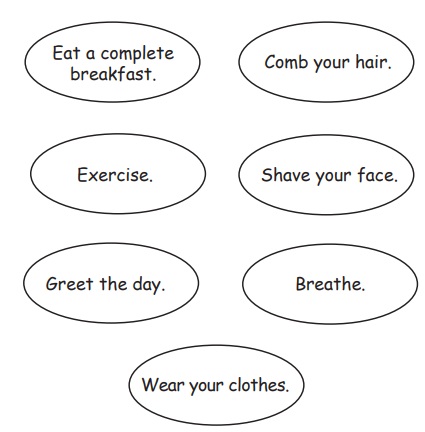
Answer:
1. Breathe.
2. Greet the day.
3. Exercise.
4. Shave your face.
5. Comb your hair.
6. Wear your clothes.
7. Eat a complete breakfast.
Note to the teacher: Scan the QR code to listen to the audio. Let the children listen to the audio and answer the question. The listening passage is given at the end.
LET US SPEAK
See how they speak at this situation and practise as if you were in that situation. A teacher is teaching the class.
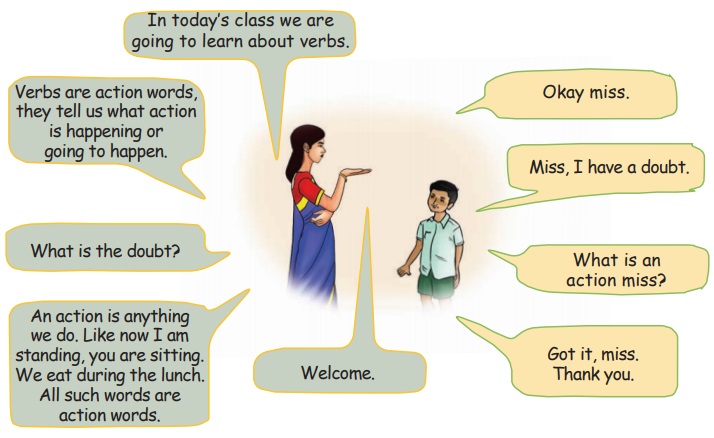
In today’s class we are going to learn about verbs.
Okay miss.
Verbs are action words, they tell us what action is happening or going to happen.
Miss, I have a doubt.
What is the doubt?
What is an action miss?
An action is anything we do. Like now I am standing, you are sitting. We eat during the lunch. All such words are action words.
Got it, miss. Thank you.
Welcome.
When you have a doubt or you don’t understand something in the class. You should always raise your hand and ask your teacher.
Some useful structures to help you:

What does ‘verb’ it mean?
I did not understand. Can you please teach again?
I have a doubt.
I am not able to understand.
Can you help?
Could you please explain?
After clearing your doubt, you should always thank your teacher.
Note to the teacher: Make the children practise these phrases and give them different scenarios to practise.
LET US READ
The Mistaken Plate
Once upon a time, there lived a merchant who sold things made of brass and tin. He used to travel across the rivers and mountains to sell. He usually travelled with another merchant, who also sold things made of brass and tin. They also used to buy things made of different metals to melt and use. The second merchant was always greedy as he tried to pay as less as possible.
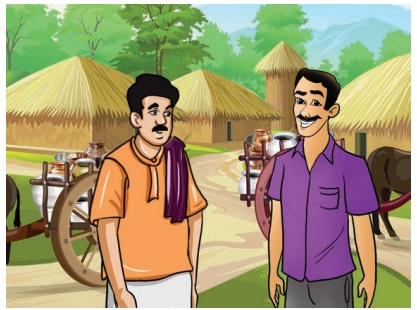
One day, when they went to a town, they divided the streets of the town. They did not want to disturb each other while selling. They moved through the streets they had chosen and called, “Utensils made of brass and tin for sale!”
In an old house, there lived a woman and her granddaughter. They were once a wealthy family but now lived in poverty. They only had one plate left as a memory of their wealth. The grandmother kept the plate in memory of her husband.
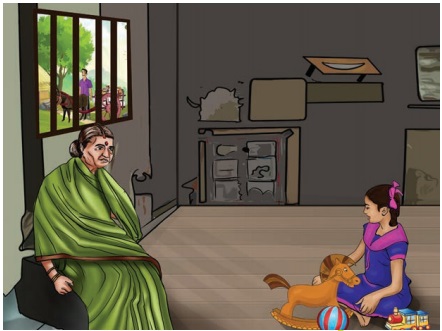
The greedy merchant passed this house saying, “Utensils made of brass and tin for sale!”
The granddaughter heard him and said to her grand mother, “Ammama, please buy something for me.”
She replied, “Kanna, we do not have money to buy anything. We do not have anything to trade with.”
The granddaughter said, “We have that one old plate that we don’t use. Let’s see what the merchant will offer for it. We can get something we can use.”
Ammama called the merchant and showed him the plate. She asked, “Will you take this plate and give any of your utensils?”
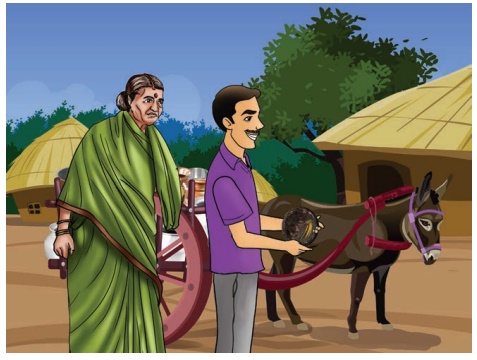
The man took the plate and scratched it with a needle. He found that it was a golden plate. He said, “What is it worth? Not even one rupee.”
He threw the plate on the ground and walked away.
Both the merchants completed their streets. They had decided that either of them could go to any house that the other did not sell in. The first merchant passed the same old house and called, “Utensils made of brass and tin for sale!”
The little girl again asked her Ammama to check.
She said, “Kanna, the first merchant threw the plate and went away. I have nothing else to offer.”
The girl replied, “Grandma, that merchant was angry. This merchant looks nice. Maybe we will get something.”
Ammama asked the girl to call the merchant and show the plate. The merchant took the plate in his hands and found that it was made of gold. He said, “I am not rich enough to buy this plate. This is a gold plate.”
Ammama said, “Are you sure? This is gold? The other merchant threw this on the ground and went away.”
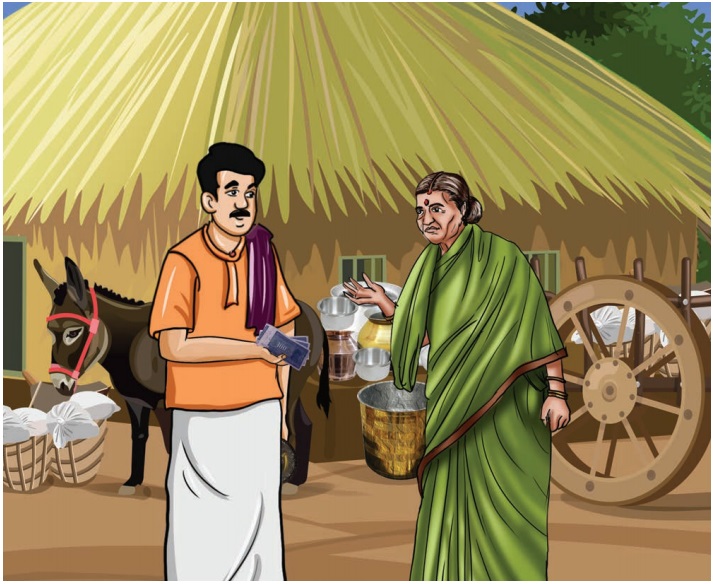
The merchant said, “I do not know why he did that. If you wish to sell it, take all the dishes you want.”
The little girl took some dishes of her choice but, the merchant was not happy. So, he gave all his money, his donkey, his cart and his wares to Ammama. He only kept eight rupees for the ferry home.
He quickly went towards the river. He paid the eight rupees to the boatman to take him across the river. Soon, the greedy merchant went back to the old house. He called the girl and said, “I’ve changed my mind. I will give you ten rupees for it.”
Ammama said, “You considered the plate worthless, but another merchant has paid a huge price for it and took it.”
A. Choose the correct answer.
1. The merchants sold things made of _____________.
a. gold
b. silver
c. brass
Answer: c. brass
2. The grandmother had kept the plate in memory of her ________.
a. son
b. husband
c. daughter
Answer: b. husband
3. In real the plate was made of ________.
a. gold
b. silver
c. brass
Answer: a. gold
4. The merchant paid __________ to the boatman.
a. ten rupees
b. eight rupees
c. three gold coins
Answer: b. eight rupees
5. Secondly the greedy merchant was ready to offer ___________.
a. ten rupees
b. twenty rupees
c. horse
Answer: a. ten rupees
B. Whose words are these? Name the character.
1. “Utensils made of brass and tin for sale!” the greedy merchant.
2. “I am not rich enough to buy this plate. This is a gold plate.” The second merchant.
3. “We do not have money to buy anything.” Grandmother.
C. Answer the following questions.
1. Who lived in the old house?
A little girl and her grandmother lived in the old house.
2. Why did the greedy merchant get angry?
The greedy merchant wanted to cheat the old woman. So he got angry.
3. Name the things that good merchant offered for the plate
For the plate the good merchant gave all his money, his donkey, his cart and his wares.
4. What will you do if you have a gold plate?
I will keep it safe with me because a gold plate is very precious.
LET US READ ALOUD
Read the passage and colour one bag each time you read.
There lived a poor but an honest farmer in a village. He supported himself, his wife and seven children using his small piece of land.
One day while he was walking in his field, he found a bag of gold.
He took it home and showed it to his wife. His wife told him to keep some of the gold. He told his wife that honesty is the best policy. He tried to find the person who lost it.
At last, he found that the owner of the bag and gave it back. The rich man took the bag and thanked him.

Read the above passage carefully and answer for the following questions.
1. What did the farmer find in the field?
a) a bag full of gold
b) a bag full of money
Answer: a) a bag full of gold
2. What is the main idea of the story?
a) farmer
b) honesty
Answer: b) honesty
LET US WRITE
Miss Meena has asked the class to write a story as a project. Let us see what the children in her class are doing.
Ravi : Hi! How are you?
Glory: I am good. And you?
Ravi : I am fine. Is your project ready?
Glory: Yes, it is. What about yours?
Ravi : I have not done it yet. Can you give me some ideas for it?
The above structure of talking is called a dialogue. In today’s class we will learn to write dialogues.
Step 1: Look at the question and understand the topic.
Step 2: Read the dialogues and understand what they are talking.
Step 3: Think what you will say if you were talking.
Step 4: Write it.
What will Glory say? Do you think you can help Glory by giving some ideas to Ravi?
Glory: You can write a story about the fox and the grapes.
Ravi: Great idea! Thank you!
Glory: Welcome Ravi.
Can we try to complete another dialogue now?
Rathi is visiting a shop to buy a pen. Let us try and complete the dialogues between her and the shopkeeper.
Rathi : Hi Akka!
Shopkeeper : Hi! How can I help?
Rathi : I need a pen.
Shopkeeper : Sure. Which colour?
Rathi : Give a blue pen.
Shopkeeper : Do you need a ten rupee pen or a five rupee pen?
Rathi : Give me the five rupee pen.
Shopkeeper : Do you want anything else?
Rathi : No, nothing else.
Shopkeeper : Thank you. Goodbye.
Rathi : Thanks bye.
I Can Do
A. Choose the word with same meaning.
1. Foot hills –
a. mountain
b. small hills
c. low hill at bass
Answer: c. low hill at bass
2. Kingdom – ________.
a. country
b. field
c. land
Answer: a. country
B. Tick (✔) the correct one.

C. Name the animal and sound it makes.
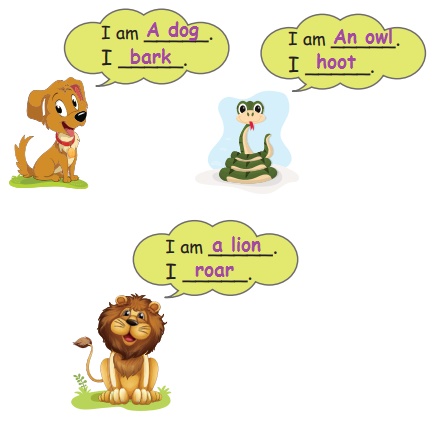
D. Match the rhyming words.
say – fall
go – day
all – grow
Answer:
say – day
go – grow
all – fall
E. Fill in the blanks with a, an and the.
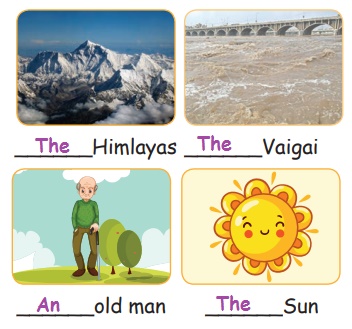
The Himalayas ; The Vaigai ; An old man ; The Sun
Learning Outcome
Now I can…
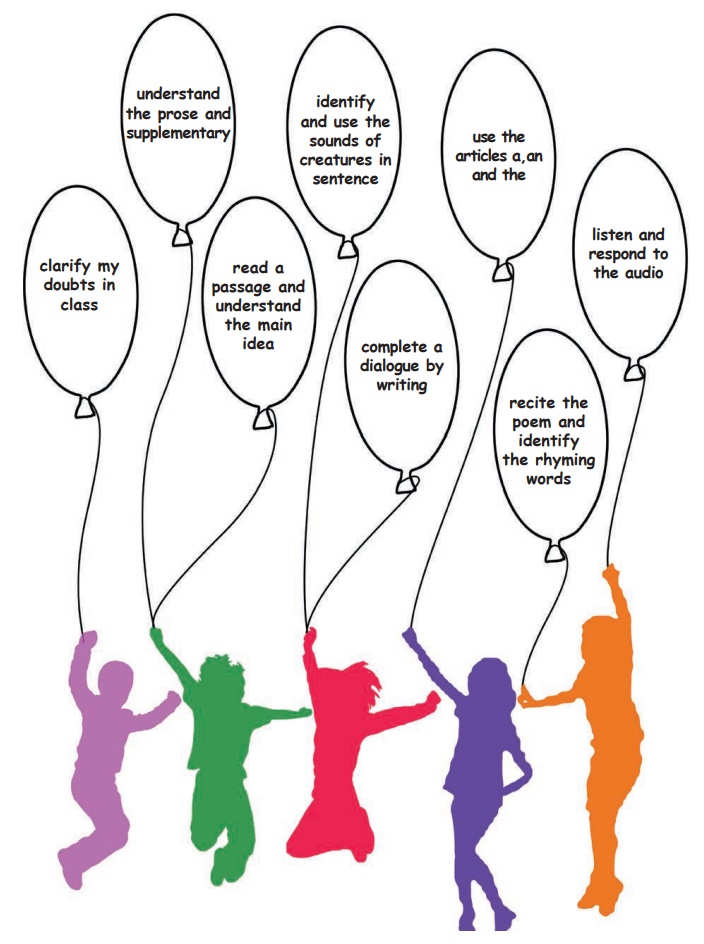
understand the prose and supplementary
identify and use the sounds of creatures in sentence
use the articles a,an and the
listen and respond to the audio
clarify my doubts in class
read a passage and understand the main idea
complete a dialogue by writing
recite the poem and identify the rhyming words
Note to the teacher: Ask children to colour the balloon when they achieve the learning outcome.














